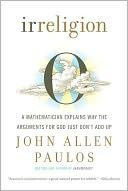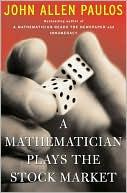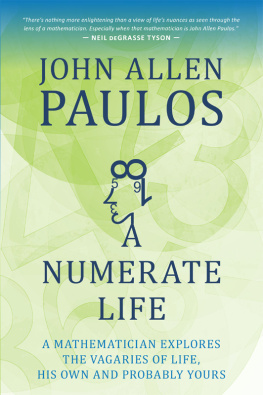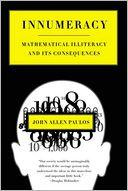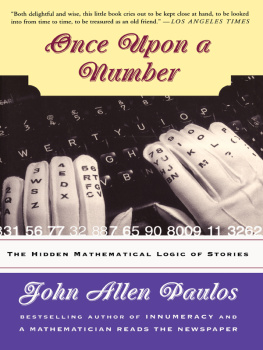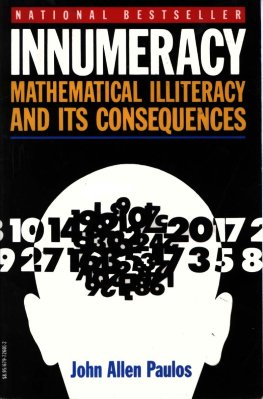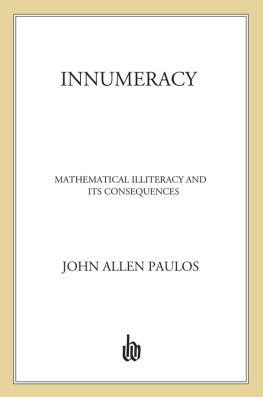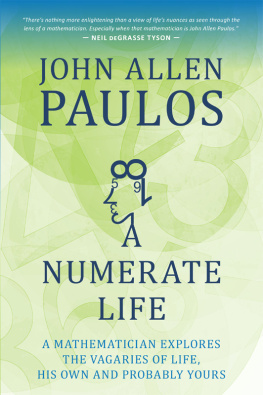IRRELIGION
ALSO BY JOHN ALLEN PAULOS
Mathematics and Humor: A Study of the Logic of Humor (1980)
I Think, Therefore I Laugh: The Flip Side of Philosophy (1985)
Innumeracy: Mathematical Illiteracy and Its Consequences (1989)
Beyond Numeracy: Ruminations of a Numbers Man (1991)
A Mathematician Reads the Newspaper (1995)
Once Upon a Number: The Hidden Mathematical Logic of Stories (1998)
A Mathematician Plays the Stock Market (2003)
IRRELIGION

A Mathematician Explains
Why the Arguments for
God Just Dont Add Up
JOHN ALLEN PAULOS

H ILL AND W ANG
A division of Farrar, Straus and Giroux
New York
Hill and Wang
A division of Farrar, Straus and Giroux
18 West 18th Street, New York 10011
Copyright 2008 by John Allen Paulos
All rights reserved
Distributed in Canada by Douglas & McIntyre Ltd.
Printed in the United States of America
Published in 2008 by Hill and Wang
First paperback edition, 2009
The Library of Congress has cataloged the hardcover edition as follows:
Paulos, John Allen.
Irreligion : a mathematician explains why the arguments for God just dont add up / by John Allen Paulos. 1st ed.
p. cm.
Includes index.
ISBN: 978-0-8090-5919-5 (hardcover : alk. paper)
1. Irreligion. 2. Atheism. 3. God. I. Title.
BL2775.3.P38 2008
212.1dc22
2007012210
Paperback ISBN: 978-0-8090-5918-8
Designed by Debbie Glasserman
www.fsgbooks.com
10 9 8 7 6 5 4 3 2 1
A tip of the hat to my longtime agent, Rafe Sagalyn; my new editor, Joe Wisnovsky; and all those whove taught me, at times unintentionally, something about the matters herein.
For Sheila, Leah, and Daniel, in whom I believe
CONTENTS
PREFACE
Are there any logical reasons to believe in God? Billions of people over thousands of years have entertained this question, and the issue is certainly not without relevance in our world today. The chasms separating literal believers, temperate believers, and outright nonbelievers are deep. There are many who seem to be impressed with the argument that God exists simply because He says He does in a much extolled tome that He allegedly inspired. Many others subscribe with varying degrees of conviction to more sophisticated arguments for God, while atheists and agnostics find none of the arguments persuasive.
Such questions of existence and belief, if not the formal arguments themselves, have always intrigued me. I remember as a child humoring my parents when they discussed Santa Claus with me. I wanted to protect them from my knowledge of his nonexistence, and so I feigned belief. My brother, three years my junior, was only a baby, so it wasnt him I was trying not to disillusion. My qualitative calculations had proved to me that there were too many expectant kids around the world for Mr. Claus to even come close to making his Christmas Eve rounds in time, even if he didnt stop for the occasional hot chocolate. This may sound like quite a pat memory for the author of a book titled Innumeracy to have, but I do remember making rough order of magnitude calculations that showed that Santa Claus was way overextended.
As Ive written elsewhere, if there is an inborn disposition to materialism (in the sense of matter and motion are the basis of all there is, not in the sense of I want more cars and houses), then I suspect I have it. At the risk of being a bit cloying, I remember another early indicator of my adult psychology. I was scuffling with my brother when I was about ten and had an epiphany that the stuff of our two heads wasnt different in kind from the stuff of the rough rug on which Id just burned my elbow or the stuff of the chair on which hed just banged his shoulder. The realization that everything was ultimately made out of the same matter, that there was no essential difference between the material compositions of me and not-me, was clean, clear, and bracing.
My youthful materialism quickly evolved into adolescent skepticism, dismissive of just-so tales devoid of evidence. The absence of an answer to the question What caused, preceded, or created God? made, in my eyes, the existence of the latter being an unnecessary, antecedent mystery. Why introduce Him? Why postulate a completely nonexplanatory, extra perplexity to help explain the already sufficiently perplexing and beautiful world? Or, if one was committed to such an unnecessary mystery, why not introduce even more antecedent ones such as the Creators Creator, or even His Great-Uncle?
This vaguely quantitative and logical mind-set no doubt predisposed me to choose the career I haveIm a mathematician whos morphed into a writerand to view the world in the way I do. It is what has animated me to write the books and columns Ive written, some of which have touched on what I call irreligiontopics, arguments, and questions that spring from an incredulity not only about religion but also about others credulity. As this and the above anecdotes suggest, Ive always found the various arguments for the existence of God that Ive come across wanting. There is an inherent illogic to all of the arguments that Ive never dealt with head-on. Here in Irreligion Ive attempted to do so.
My approach in this book is informal and brisk (at least I hope it is), not ceremonious and plodding (at least I hope it isnt). Interspersed among the arguments will be numerous asides on a variety of irreligious themes, ranging from the nature of miracles and creationist probability to cognitive illusions and prudential wagers. Beginning with a schematic outline of an argument, most chapters will briefly examine it and then present what I believe is a succinct deconstruction. The arguments considered range from what might be called the golden oldies of religious thought to those with a more contemporary beat. On the playlist are the first-cause argument, the argument from design, the ontological argument, arguments from faith and biblical codes, the argument from the anthropic principle, the moral universality argument, and others. These arguments overlap to an extent, but Ive loosely categorized them in an order that seems somewhat natural.
Dont worry if your mathematical skills are rusty or even completely absent. Although Im a mathematician, Ive not included a single formula in the book. This doesnt mean that mathematics plays little role in what follows. The subject enters in two ways. First, I invoke bits of logic and probability throughout the book, always taking pains in my expositions of them to avoid not only formulas but equations, complicated computations, and technical jargon. Second and more significant, mathematics, or at least my mathematical sensibility, reveals itself in the analytic approach, my choice of examples, and the distaste for extraneous details apparent herein. (Mathematicians are a bit like the laconic Vermonter who, when asked if hes lived in the state his whole life, replies, Not yet.)
Fully discussing the arguments for God and their refutations, together with the volumes and volumes of commentary and meta-commentary that they continue to generate, brings to mind the predicament of Tristram Shandy. He was the fictional fellow who took two years to write the history of the first two days of his life. In an effort to avoid Shandys fate and not lose the withered forest for the debunked trees, Ive tried in this bookactually more of a handbook or a compendiumto sketch with a lightly heretical touch only the most trenchant refutations of the arguments for God. That is, just the gist, with an occasional jest. These refutationssome new and idiosyncratic, but many dating back centuries or even millenniaare not nearly as widely known as they once were, and therefore, I believe, there is value in having them all available in one place. (For this reason Ive here adapted some sections from the other books and columns of mine that I mentioned above.)
Next page
